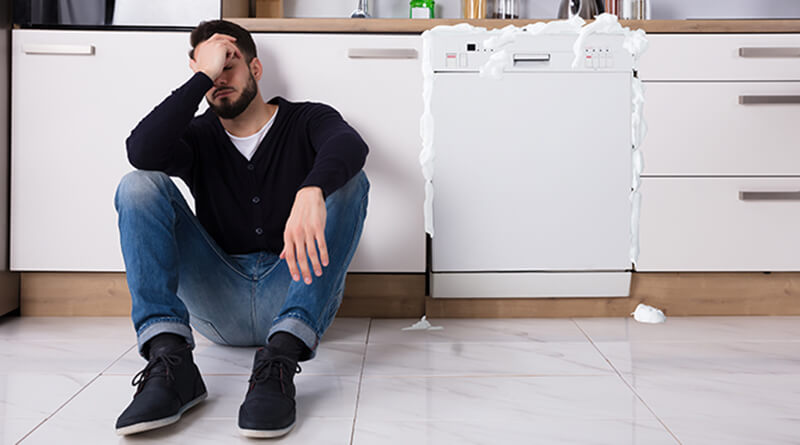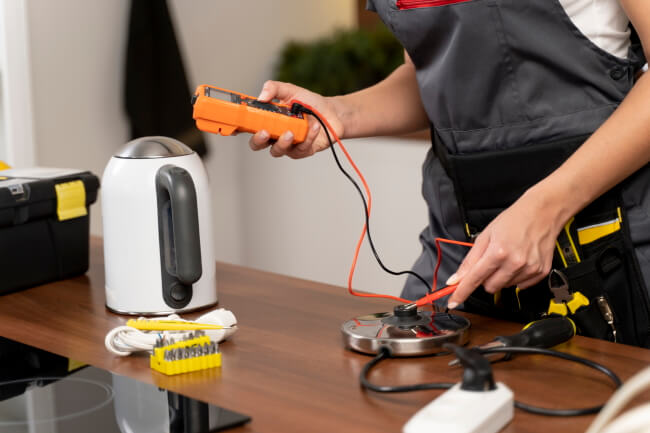

We’ve all been there, haven’t we? Your faithful old refrigerator suddenly starts making a mysterious clanging noise, your washer seems to have developed a sudden distaste for spin cycles, or perhaps your oven is playing hide-and-seek with the proper temperature. In those moments, you face a classic dilemma: Should you repair the appliance or replace it with a shiny new one?
It’s a decision that can have a significant impact on your wallet, your daily life, and even the environment. In this comprehensive guide, we’ll delve deep into the factors you should consider when weighing the options of replacing versus repairing your appliances. Let’s explore when it’s time to embrace the new and when your old friend might still have some life left.
Assessing the Damage: The Age Factor
Question: Is your appliance a grizzled veteran or a newbie in the game?
The age of your appliance is one of the most critical factors to consider when deciding whether to repair or replace. In the world of appliances, age matters. Much like fine wine, appliances tend to improve with age – up to a point, that is.
For instance, refrigerators, washing machines, and stoves can have a relatively long lifespan. In general, you can expect them to last anywhere from 10 to 15 years. However, when your appliance starts pushing that 15-year mark, it’s akin to a seasoned athlete competing in the Olympics. It’s impressive, but it might not be able to keep up with the young guns anymore.
Answer: If it’s ancient, it’s replacement time!
Older appliances tend to be less energy-efficient, often lack the latest technological advances, and can be more prone to breakdowns. With rapid advancements in technology, newer appliances are designed to be more eco-friendly and cost-effective in the long run. They often come equipped with features like energy-saving modes, quieter operation, and smart technology that can make your life easier.
Repair Costs vs. Replacement Costs: Show Me the Money!

Question: How deep are your pockets?
Money, as they say, makes the world go ’round. So, let’s talk about the financial aspect of this decision. Repairing your appliance might initially seem like a cost-effective solution. After all, why spend hundreds or even thousands of dollars on a new appliance when a simple repair could fix the issue?
However, here’s the catch. Sometimes those “simple” repairs can turn into a financial quagmire. One repair leads to another, and before you know it, you’ve spent a small fortune trying to keep your old appliance on life support.
Answer: If the repair costs are creeping up to 50% or more of the cost of a new appliance, it’s time to replace.
Let’s break it down further with a handy table:
| Appliance | Estimated Lifespan | Repair Costs (as % of new) |
| Refrigerator | 10-15 years | 40-70% |
| Washer/Dryer | 10-15 years | 40-60% |
| Dishwasher | 8-10 years | 50-70% |
| Stove/Oven | 10-15 years | 50-70% |
The numbers don’t lie. If your appliance’s repair costs approach the price of a shiny new replacement, you’re better off investing in a more reliable, efficient, and modern alternative.
Energy Efficiency Matters: Save the Green and Go Green
Question: Do you like burning money?
Let’s talk about the green in your wallet and the green in the environment. Energy efficiency is not just a buzzword; it’s a crucial aspect to consider when deciding between repairing and replacing your appliance.
Older appliances, especially those past their prime, tend to be energy hogs. If your appliance belongs to a generation that never heard of energy-saving modes or LED lighting, it’s probably gobbling up more electricity than you realize.
Answer: If your appliance is an energy vampire, consider replacing it with an Energy Star-certified one.
Energy Star-certified appliances are designed to consume less energy, which can lead to significant long-term savings on your electricity bill. Additionally, many governments offer incentives and rebates for upgrading to more energy-efficient appliances, making it a financially savvy decision as well.
Functionality Check: Is It Still Doing Its Job?
Question: Does it do what it’s supposed to do?
At its core, an appliance is there to make your life easier. It’s not just a hunk of metal or plastic; it’s a helping hand in your daily chores. When your appliance starts malfunctioning or can’t perform its primary functions correctly, it’s time to reconsider its place in your home.
Is your refrigerator no longer keeping your food at a safe temperature? Is your dishwasher leaving your dishes dirtier than when you put them in? These are clear signs that your appliance might be past its prime.
Answer: If it ain’t doing its job, you might want to look for a replacement.
Remember, an appliance that doesn’t work properly not only causes frustration but can also lead to spoilage, food waste, and the need for additional repairs.
Safety First: Is Your Appliance a Hazard?

Question: Is your appliance turning into a safety hazard?
Your appliances should never pose a threat to your safety or that of your loved ones. If your appliance starts exhibiting dangerous behaviors, such as sparking, smoking, or leaking, it’s a red flag that you shouldn’t ignore.
Electrical issues, gas leaks, and other safety concerns can turn your trusty appliance into a potential hazard. In such cases, opting for a repair might not be the best decision, especially when it comes to safety.
Answer: When safety’s on the line, replacement is the way to go.
Your family’s safety should always be the top priority. A malfunctioning appliance could lead to serious accidents or damage to your home, making replacement a responsible choice.
Environmental Impact: Be Eco-Friendly
Question: Do you love Mother Earth?
In our journey to make the right decision, let’s not forget about our beloved Mother Earth. As responsible citizens, it’s our duty to minimize our environmental footprint.
When it’s time to say goodbye to your old appliance, don’t just toss it in the landfill. Many of its components, like metal, glass, and plastic, can be recycled and repurposed, reducing the strain on our planet’s resources. Additionally, some retailers offer recycling programs or take back old appliances when you purchase a new one.
Answer: Be eco-friendly and dispose of your old appliance responsibly.
By recycling, you contribute to a more sustainable future and ensure that valuable materials don’t go to waste. It’s a small effort that can make a big difference.
The Verdict: Making the Right Call
So, after considering all these factors, what’s the verdict?
It’s clear that there’s no one-size-fits-all answer to the “repair or replace” conundrum. The decision often hinges on a combination of factors, including the age of the appliance, the extent of repairs needed, the impact on your budget, and the environmental considerations.
But here’s a simple rule of thumb: if your appliance is old, costly to repair, inefficient, and poses safety risks, it’s likely time to say farewell. Investing in a new, energy-efficient appliance not only ensures peace of mind but also contributes to lower energy bills and a healthier planet.
Before making any final decisions, take time to research the latest models and compare their features, energy efficiency ratings, and warranties. This will help you make an informed choice and find an appliance that suits your needs and budget.
Now that you’re armed with this knowledge, go forth and make those appliance decisions with confidence. Whether you choose to repair or replace, remember that it’s all part of the journey of maintaining your home and embracing the future. Cheers to your next appliance adventure!
Going the Extra Mile: Maintenance for Longevity
Before we wrap up, let’s touch on a crucial aspect that can extend the life of your appliances and save you from the “repair or replace” dilemma: regular maintenance.
Proper maintenance not only keeps your appliances running efficiently but also reduces the risk of unexpected breakdowns. Here are some tips to help you get the most out of your appliances:
- Clean and Defrost Regularly: For appliances like refrigerators and freezers, regular cleaning and defrosting can prevent ice build-up, which can strain the compressor and reduce efficiency.
- Check Seals and Gaskets: A worn or damaged seal on your refrigerator or oven can lead to temperature fluctuations and energy waste. Ensure that seals are intact and functioning correctly.
- Clean Filters and Vents: In appliances like dishwashers and dryers, clogged filters and vents can reduce performance. Clean them periodically to maintain efficiency.
- Regular Inspections: Periodically inspect your appliances for signs of wear and tear. Look for loose wires, damaged hoses, or anything that seems out of the ordinary.
- Follow Manufacturer’s Recommendations: Read your appliance’s manual and follow the manufacturer’s recommendations for maintenance. This can help you avoid common issues.
- Professional Maintenance: Consider scheduling professional maintenance for complex appliances like HVAC systems and water heaters. A technician can identify and address potential problems before they become major issues.
By incorporating these maintenance practices into your routine, you can significantly extend the life of your appliances, making it less likely that you’ll face the repair or replace dilemma any time soon.
Weigh Your Options Wisely
Deciding between repairing and replacing your appliances is no small matter. It involves considering factors like age, repair costs, energy efficiency, functionality, safety, and environmental impact. While there is no one-size-fits-all answer, this comprehensive guide should equip you with the knowledge to make an informed decision.
Remember, your appliances play a significant role in your daily life, making tasks easier and more efficient. Whether you choose to repair or replace, prioritize your safety, financial well-being, and the planet’s health.
Now that you’re well-informed, go out there and make your appliance decisions with confidence. Whether you opt for a modern upgrade or decide to give your trusty old appliance a new lease on life, you’re on the path to a happier, more efficient home. Happy appliance adventures!
Frequently Asked Questions (FAQ) – Replacing vs. Repairing: When Is It Time for a New Appliance?
We understand that the decision to repair or replace your appliances can be a complex one. To provide you with more clarity, we’ve compiled a list of frequently asked questions to address common concerns regarding this topic.
1. When should I consider repairing my appliance rather than replacing it?
If your appliance is relatively new, in good condition, and the cost of repairs is significantly lower than the cost of a new appliance, repair may be the better option. Additionally, if your appliance is under warranty, the repair may be covered.
2. What are some signs that it’s time to replace my appliance?
Consider replacement if your appliance is old, outdated, inefficient, or if the cost of repairs exceeds 50% of the price of a new appliance. Safety concerns, such as electrical issues or gas leaks, should also prompt replacement.
3. How can I determine the age of my appliance?
You can usually find the manufacture date on a label or a metal plate located on your appliance. If you’re unsure, consult the user manual or contact the manufacturer for assistance.
4. Are there any environmental benefits to replacing my old appliances?
Yes, replacing older appliances with energy-efficient models can reduce your carbon footprint. New appliances often come with energy-saving features, resulting in lower energy consumption and decreased greenhouse gas emissions.
5. What are the advantages of Energy Star-certified appliances?
Energy Star-certified appliances are designed to be more energy-efficient. They can save you money on your energy bills and reduce environmental impact. Many governments offer incentives and rebates for purchasing Energy Star-certified appliances.
6. Can I recycle my old appliances?
Yes, recycling your old appliances is an eco-friendly option. Many communities offer recycling programs for appliances. Additionally, some retailers may accept your old appliances for recycling when you purchase a new one.
7. How can I extend the life of my appliances?
Regular maintenance is key to prolonging the life of your appliances. Clean and defrost as needed, check seals and gaskets, clean filters and vents, and schedule professional maintenance for complex appliances.
8. What should I consider when shopping for a new appliance?
When shopping for a new appliance, consider factors like energy efficiency, features, warranties, and user reviews. It’s essential to choose an appliance that meets your specific needs and budget.
9. Is it better to repair or replace an appliance under warranty?
If your appliance is under warranty, it’s generally better to opt for repairs covered by the warranty. However, consider the cost of any extended warranties and whether the issue is likely to recur after the warranty period expires.
10. How do I dispose of appliances safely?
When disposing of appliances, ensure they are recycled or disposed of properly to prevent environmental harm. Check with your local recycling centers or waste management facilities for guidance on safe disposal methods.
